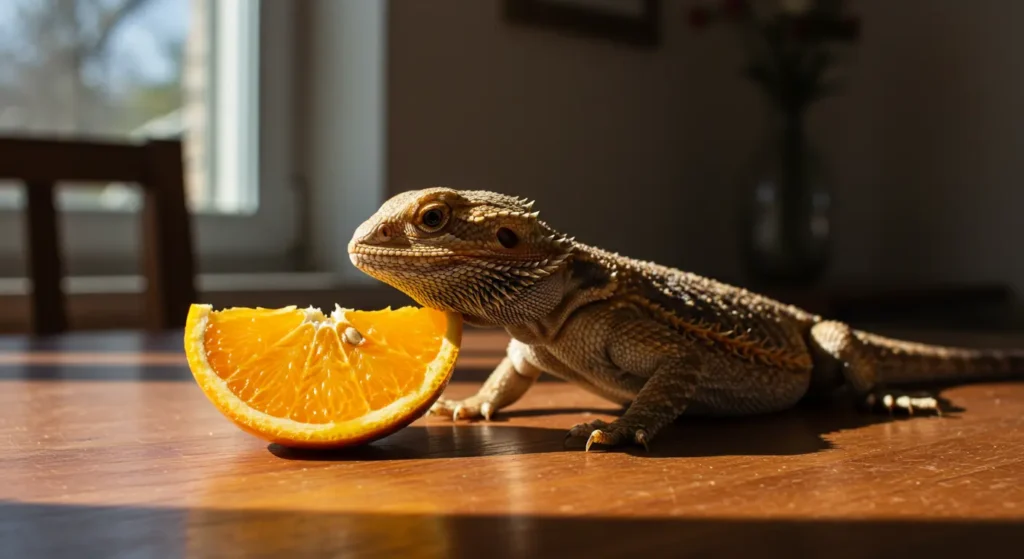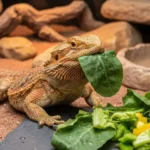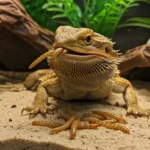Can bearded dragons eat oranges? It’s a common question among new and experienced reptile owners alike. After all, oranges are packed with vitamin C and seem like a juicy, refreshing treat—but when it comes to reptile care, not everything that’s healthy for humans is safe for our scaly friends.
You might be tempted to share a slice with your beardie, but can bearded dragons eat oranges without health risks? Or could this citrus fruit do more harm than good? In this guide, we’ll break down the nutritional facts, potential dangers, and safe feeding practices to help you make the best choice for your bearded dragon’s diet.
Can Bearded Dragons Eat Oranges Safely? Here’s What You Need to Know
Oranges might seem like a harmless, vitamin-rich snack, but when it comes to bearded dragons, things aren’t so simple. In this section, we’ll explore whether oranges are truly safe for your beardie, how often they can be offered, and what the experts have to say about including citrus in a reptile’s diet.
Common Misconceptions About Feeding Citrus to Reptiles
Many reptile owners assume that if a fruit is healthy for humans, it must be good for their pets too. This is especially common with citrus fruits like oranges, which are packed with vitamin C and seem like a hydrating treat. However, this assumption can be dangerous. Citrus fruits, including oranges, contain high levels of citric acid and oxalates, both of which can be harmful to reptiles. One common myth is that feeding a small amount “once in a while” is harmless. While an occasional taste might not cause immediate harm, the acidic nature of citrus can build up over time and lead to digestive irritation or calcium depletion. Another misconception is that all fruits are equally safe for bearded dragons. In truth, citrus fruits like oranges, lemons, and grapefruits pose a far greater risk than low-acid options like papaya or mango. Understanding these myths helps prevent accidental harm and ensures your bearded dragon thrives on a species-appropriate diet.
Orange nutrition facts: Are the vitamins worth the risks for bearded dragons?
Oranges are well-known for being high in vitamin C, potassium, and dietary fiber. These nutrients are beneficial for humans, but they don’t translate the same way to reptiles. Bearded dragons have very different digestive systems, and what helps one species may harm another. The high sugar content in oranges is one concern, especially for a reptile prone to obesity, fatty liver disease, or diabetes when fed too many sugary foods. More importantly, oranges contain oxalic acid, which binds to calcium in the body and prevents its absorption. This can contribute to metabolic bone disease (MBD)—a common and serious condition in bearded dragons. Although oranges have some calcium, the presence of oxalates cancels out much of the benefit. Additionally, the citric acid in oranges can irritate your beardie’s stomach lining, causing diarrhea and dehydration. Overall, while oranges offer some nutritional benefits, the risks far outweigh the rewards for bearded dragons.
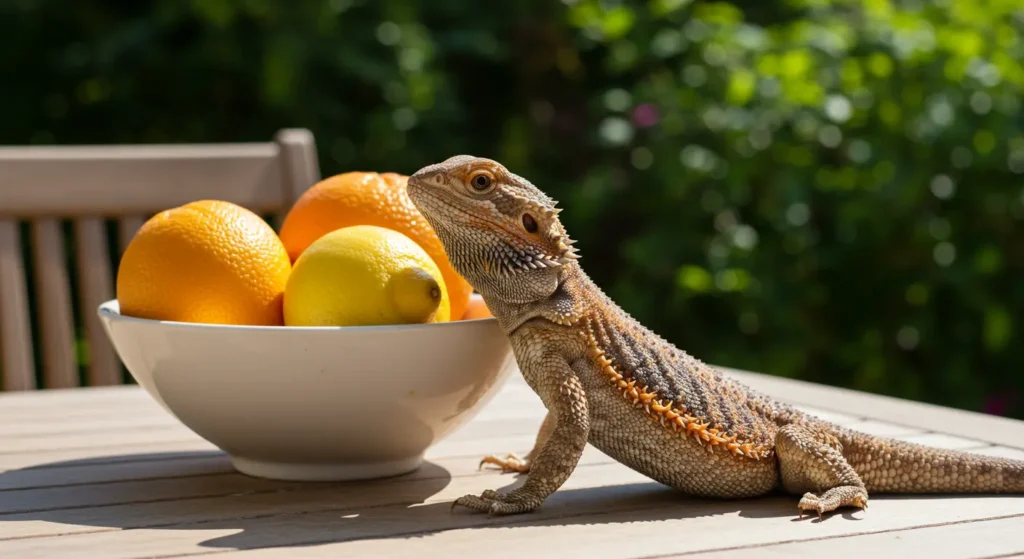
Occasional Treats or Daily Danger? How Often Is Too Much
Even though oranges are not inherently toxic, feeding them regularly can lead to long-term health problems for bearded dragons. Their digestive systems are not designed to handle high-acid or high-sugar foods frequently. If you choose to offer oranges at all, it should be no more than once every few months—and in a very small portion. Even then, the risks may still outweigh the benefits. Many owners assume a small bite of fruit daily is a good way to bond or provide variety, but that approach can backfire. Daily exposure to acidic fruits can slowly cause calcium imbalance, gut inflammation, and other issues. It’s far safer to stick with low-acid fruits that are proven to be beardie-safe, like papaya, figs, or mango. Remember: when it comes to citrus, less is more—and none might be best.
What reptile vets and long-time keepers say about feeding oranges to bearded dragons
Reptile veterinarians and experienced keepers generally agree: oranges should not be part of a bearded dragon’s regular diet. While occasional, trace amounts may not result in immediate harm, long-term feeding of citrus fruits has been linked to a variety of health issues. Experts emphasize avoiding high-oxalate and acidic foods to prevent calcium loss and digestive upset. Most keepers follow a feeding schedule that prioritizes leafy greens, safe vegetables, and low-sugar fruits offered once or twice per week. The recommendation is clear: oranges, clementines, and other citrus should be avoided entirely or used only in emergency situations where hydration or appetite stimulation is needed—under professional supervision. Following advice from reptile-specific vets and trusted care guides is the safest route for keeping your beardie healthy and thriving.
The Hidden Dangers of Citrus Fruits for Bearded Dragons
Citrus fruits like oranges may appear harmless, but they carry serious health risks for bearded dragons. In this section, we’ll break down the hidden dangers—ranging from nutrient loss to digestive issues—that make citrus a poor choice for your reptile’s diet.
Oxalic Acid and Its Effect on Calcium Absorption
Oxalic acid is one of the most harmful compounds in citrus fruits when it comes to reptile health. It binds with calcium inside the body, forming a substance called calcium oxalate. This bound form of calcium can’t be absorbed by the body, which leads to a dangerous calcium deficiency over time. For bearded dragons, calcium is vital for strong bones, muscle function, and overall health.
Even if your bearded dragon is receiving calcium supplements, too much oxalic acid can cancel out those benefits. Oranges are particularly high in oxalates, making them a risky food choice. If oxalate intake becomes routine, it can lead to weakened bones and other long-term health issues. This is why foods high in oxalates should be strictly limited or completely avoided in a beardie’s diet. Maintaining proper calcium absorption is crucial for preventing disease and supporting growth, especially in young or growing dragons.
Citric acid sensitivity: Why bearded dragons struggle with citrus digestion
Citric acid gives oranges their signature tart flavor—but it’s also harsh on the sensitive digestive system of reptiles. While humans can handle citric acid without much trouble, bearded dragons are far more delicate. Ingesting too much citric acid can irritate their stomach lining and intestines.
This irritation can lead to diarrhea, bloating, or loss of appetite. Diarrhea, in particular, poses a serious risk of dehydration. Bearded dragons come from arid environments and are naturally adapted to retain water, but prolonged digestive upset can quickly dehydrate them. This weakens their ability to absorb nutrients and may result in a cascading effect on their overall health.
Even small amounts of citric acid, especially if fed regularly, can build up and create discomfort for your beardie. This is why citrus fruits—including oranges, lemons, and grapefruits—are not suitable for regular feeding and should be avoided altogether.
High sugar in oranges: Obesity and liver problems in pet reptiles
Oranges are naturally high in sugar, which makes them sweet and appealing—but not ideal for bearded dragons. Reptiles have slow metabolisms and don’t need much sugar in their diet. Consuming too much sugar over time can lead to a number of health issues, including weight gain, liver stress, and even diabetes.
Bearded dragons that are fed sugary fruits too often may develop fatty liver disease. This condition causes fat to build up in the liver, making it harder for the organ to process nutrients. Obesity is also a risk, particularly for pet dragons with limited space and activity. Excess fat can put stress on joints, organs, and the heart.
While a tiny piece of orange might seem harmless, regular feeding of sugary fruits is not recommended. There are plenty of healthier fruit alternatives with lower sugar content. Choosing better options helps protect your beardie’s internal health while still offering occasional treats.
Can bearded dragons eating oranges lead to metabolic bone disease (MBD)?
Yes, feeding citrus fruits like oranges can contribute to metabolic bone disease (MBD) in bearded dragons. This serious condition develops when a reptile’s body lacks the calcium it needs to maintain strong bones. When calcium is consistently blocked or depleted—often due to a poor diet—the body begins pulling calcium from the bones themselves.
Citrus fruits contribute to this problem in two ways. First, their oxalic acid prevents calcium absorption. Second, their acidity and high sugar content can disrupt digestion, leading to poor nutrient uptake overall. MBD symptoms include swollen limbs, lethargy, tremors, and even bone fractures. In severe cases, the disease can lead to paralysis or death.
Feeding oranges, even occasionally, increases the risk of calcium imbalance—especially if your dragon’s diet isn’t already rich in calcium and vitamin D3. Avoiding citrus altogether is one of the most effective ways to help prevent MBD and keep your bearded dragon strong and healthy.
Can Bearded Dragons Eat Oranges of All Varieties? Assessing the Safety of Different Types
Not all oranges are created equal—but does that mean some are safe for your bearded dragon? In this section, we’ll take a closer look at different orange varieties, peels, and even baby beardies to see if any exceptions exist or if all citrus should be off-limits.
Can Bearded Dragons Eat Oranges Like Mandarins, Clementines, and Navel Oranges?
At first glance, mandarins, clementines, and navel oranges might seem like harmless variations of the same fruit. While they differ slightly in sweetness and acidity, all of them fall into the citrus category—and that’s where the problem lies. Mandarins are typically sweeter and less acidic than navel oranges. Clementines are seedless and easier to peel, but they still contain high amounts of sugar and citric acid.
Many reptile owners believe that mandarins or clementines are safer because they taste milder. Unfortunately, this isn’t true for bearded dragons. All three varieties contain similar levels of oxalic acid, which interferes with calcium absorption, and citric acid, which irritates the digestive tract. Even the sugar content is enough to contribute to obesity and other metabolic issues.
So while these fruits may differ slightly in flavor or texture, they all pose the same health risks. No orange variety is truly safe for regular or occasional feeding. It’s best to avoid citrus entirely to protect your bearded dragon’s long-term health.
Why Orange Peels Are Even More Harmful
You might think that orange peels are safer because they contain less juice—but in reality, they can be even more harmful to bearded dragons. The peel is tougher and more difficult to digest, which poses a choking risk or may cause impaction in the digestive tract. Unlike soft fruit flesh, the thick, fibrous texture of peels can sit undigested in the gut.
Orange peels also contain essential oils, including limonene, which can be toxic to reptiles. These oils may cause skin irritation, internal discomfort, or chemical reactions in your beardie’s body. Additionally, the peel still contains oxalic acid and other natural pesticides that are difficult to fully wash away.
Even though peels contain more calcium than the fruit itself, the presence of harmful compounds cancels out any benefit. Offering orange peel to your bearded dragon is not only nutritionally pointless—it’s dangerous. It’s best to keep all parts of citrus fruits, including peels, out of their diet completely.
Can Baby Bearded Dragons Tolerate Small Amounts?
Baby bearded dragons are still growing, which means their bones, muscles, and organs are developing rapidly. During this stage, they need a carefully balanced diet rich in calcium, protein, and hydration. Offering citrus fruits like oranges—even in small amounts—can disrupt this balance and create lasting damage.
Because their bodies are still forming, babies are especially vulnerable to calcium deficiency. The oxalic acid in oranges binds to calcium and prevents proper absorption. This can lead to developmental issues and increase the risk of metabolic bone disease (MBD) early in life.
Additionally, baby dragons have more sensitive digestive systems. They are more likely to suffer from diarrhea, dehydration, or nutrient malabsorption after eating citrus. Even a small piece of orange may cause stress on their tiny systems. Experts recommend avoiding all citrus fruits entirely until your dragon is fully grown. Even then, the risks often outweigh the benefits.
Can Bearded Dragons Eat Oranges Accidentally? What to Do if Your Beardie Eats Orange Slices
If your bearded dragon accidentally eats a slice of orange, there’s no need to panic—but you should monitor them closely for the next 24–48 hours. The first step is to remove any remaining orange and ensure they don’t consume more. Offer plenty of fresh water to help dilute the acidity and keep your beardie hydrated.
Watch for signs of digestive upset, such as soft or watery stool, lethargy, bloating, or a loss of appetite. If you notice diarrhea, it’s important to act quickly—this can lead to dehydration, especially in younger or smaller dragons. Provide easily digestible foods like collard greens or squash for the next day or two, and avoid feeding fruit altogether during that time.
In most cases, a single small slice won’t cause long-term harm, but repeated exposure increases the risk of health issues. If symptoms worsen or persist, consult a reptile vet. Moving forward, double-check all food items before feeding and keep citrus out of reach to prevent future accidents.
How Orange-Fed Insects Affect Your Bearded Dragon
Feeder insects like crickets and Dubia roaches are a staple in a bearded dragon’s diet—but what happens when those insects eat oranges? In this section, we’ll explore how citrus-fed bugs impact your beardie’s health and whether feeding oranges to your feeder insects is a safe or risky practice.
Can Bearded Dragons Eat Oranges via Dubia Roaches and Crickets?
Dubia roaches and crickets can safely eat oranges in small amounts. Many breeders use citrus to hydrate or boost their feeder insects’ nutrient intake. These insects digest fruit differently than reptiles. They break down citric acid and sugar in a way that makes it less harmful when passed on to your bearded dragon.
This makes oranges a usable gut-loading option for insects, especially if offered occasionally. However, moderation is key. Overfeeding oranges to feeder insects can lead to overly acidic gut contents. When passed to your beardie, this may still cause digestive irritation—especially in sensitive or young dragons.
If you use oranges as a gut-load, balance them with high-calcium and low-oxalate foods like dark leafy greens or squash. The goal is to enrich the feeder insect’s body without introducing risky elements into your dragon’s system.
Gut-Loading Tips for Boosting Feeder Insect Nutrition
Gut-loading is the process of feeding your insects nutrient-rich foods before offering them to your bearded dragon. This enhances the nutritional value of each bite your beardie eats. While oranges can provide hydration and a temporary energy boost to insects, they shouldn’t be the foundation of a gut-loading routine.
Instead, focus on gut-loading with high-calcium, low-phosphorus vegetables like collard greens, mustard greens, and dandelion greens. Squash, sweet potatoes, and carrots also add fiber and vitamins. You can offer a small piece of orange once or twice a week to hydrate feeder insects, but avoid making citrus a staple.
Always gut-load insects 12–24 hours before feeding them to your dragon. Remove uneaten food from the insect enclosure to prevent mold or contamination. For best results, rotate your gut-loading ingredients and avoid high-sugar or acidic items too frequently. A balanced gut-load not only supports your bearded dragon’s health but also improves digestion and reduces the risk of nutrient loss.
Frequency and Portion Control When Feeding Citrus-Fed Bugs
If you decide to include oranges in your feeder insects’ diet, do so sparingly. Offer a small slice once or twice a week at most. This helps provide moisture and a quick nutrient boost without overloading the insects with sugar or acid.
Feeding citrus too frequently can lead to overly acidic insects, which may irritate your bearded dragon’s digestive tract. It’s best to pair the orange with other gut-loading foods like leafy greens, carrots, or squash. This balances the insect’s nutritional profile and reduces the concentration of citric acid passed to your dragon.
Avoid feeding insects that have eaten citrus on the same day more than once. Portion control also matters—too much orange at once can ferment in the insect enclosure, leading to bacteria growth or poor insect health. In moderation, citrus-fed bugs aren’t a major threat. But consistency, balance, and portion control are essential to ensure your beardie only gets the benefits, not the risks.
Safer Fruit Alternatives to Oranges for a Healthy Beardie Diet
While oranges are off the menu, there are still plenty of fruits that can safely be part of your bearded dragon’s diet. In this section, we’ll explore healthy, low-acid fruit alternatives that offer valuable nutrients without the risks associated with citrus.
Best Fruits to Offer Weekly: Mango, Figs, and Papaya
While citrus fruits are unsafe for bearded dragons, several low-acid fruits can safely be offered once a week. Mango, figs, and papaya are excellent options. Mango is soft, easy to chew, and rich in vitamin A, which supports eye and skin health. Figs are high in calcium and fiber, making them especially valuable in supporting strong bones and digestion. Cantaloupe is another great choice for variety—read our full guide on can bearded dragons eat cantaloupe to learn more. Papaya is low in acid and sugar, while offering beneficial enzymes that aid digestion.
These fruits provide variety and flavor without the dangers of oxalic acid or citric acid. They should still be treated as treats—not staples—but they are much safer than oranges or other citrus options. Offering a small piece once a week keeps your beardie interested in food and adds important micronutrients to their diet. Always rotate fruits to provide a balance of nutrients without overwhelming their system.
Creating a Balanced Reptile Diet with Low-Acid Fruits
A healthy bearded dragon diet isn’t just about offering the right fruits—it’s about balance. Vegetables and leafy greens should make up the majority of their meals. Low-acid fruits like figs, mango, papaya, and blueberries should only be offered occasionally to supplement their main diet. These fruits provide hydration, vitamins, and natural sugars, but too much can still lead to digestive upset or obesity.
The key is variety and portion control. Rotate fruits weekly and combine them with calcium-rich greens like collard or mustard greens. This helps maintain bone health and supports digestion. Avoid feeding multiple fruits at once or offering sugary fruits too frequently. A balanced approach prevents nutritional deficiencies and ensures your bearded dragon stays energetic and thriving. If you’re unsure where to start, try creating a weekly feeding schedule to keep their meals organized and consistent.
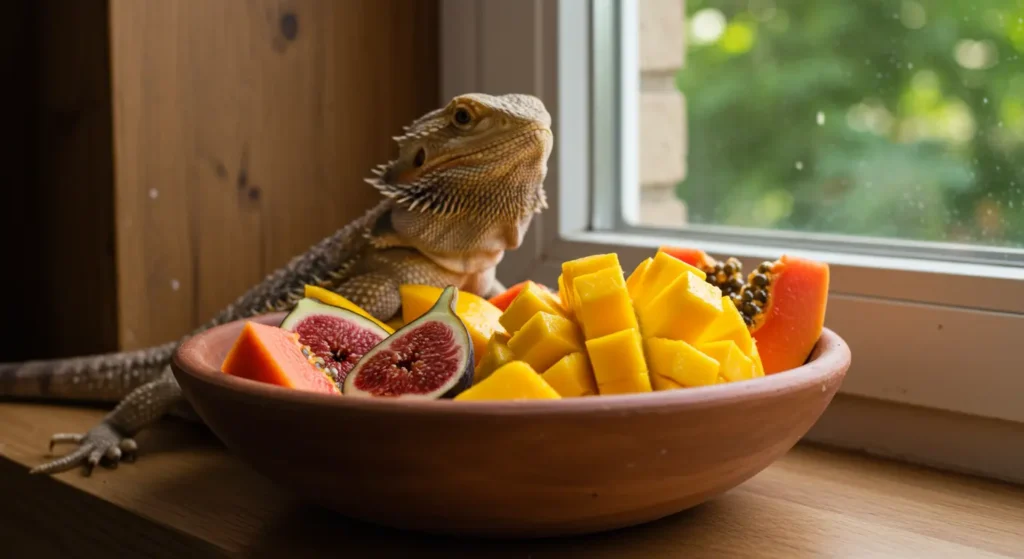
Conclusion: Should Bearded Dragons Eat Oranges?
So, can bearded dragons eat oranges? The clear answer is no—at least not as a regular part of their diet. While oranges may seem like a sweet, vitamin-rich treat, their high levels of sugar, citric acid, and oxalates pose serious risks to your beardie’s health. From digestive irritation to calcium depletion and metabolic bone disease, the dangers outweigh any nutritional benefits.
Instead, stick with safer, low-acid fruits like mango, figs, and papaya, and focus on building a balanced diet centered around calcium-rich greens and appropriate protein sources. If your bearded dragon accidentally consumes a bit of orange, it’s not an emergency—but it should be a reminder to stay mindful of what goes in their bowl.
By understanding the risks and making informed choices, you’ll help your bearded dragon thrive and live a long, healthy life. Always consult with a reptile vet if you’re unsure, and remember—when in doubt, leave citrus out.

